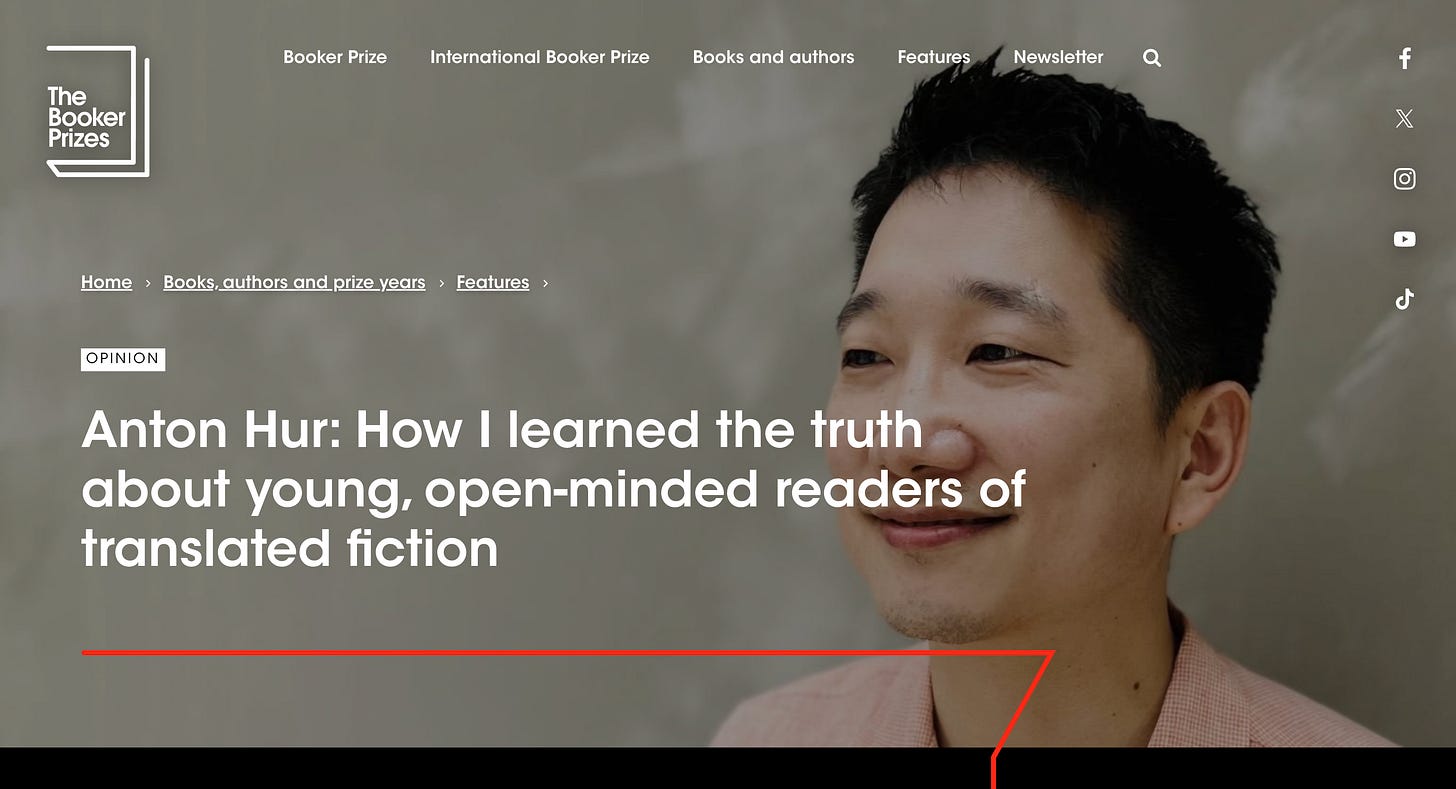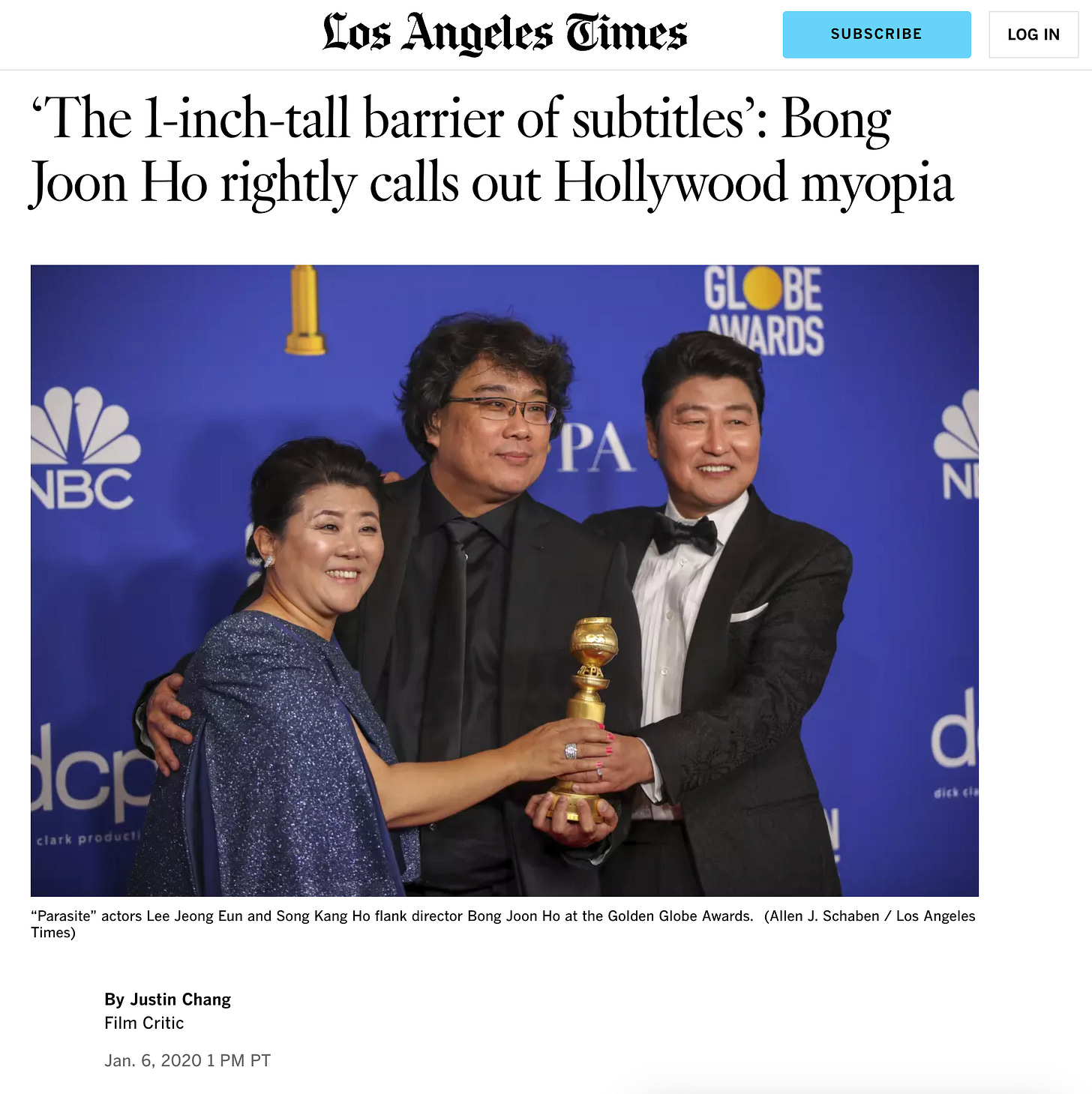Do I still matter to the publishing industry as an unprofitable reader?
My friends and I love translated literature, but we don't happen to be big purchasers.
Welcome to Reading the (Un)Familiar, where Jin curates translated and diasporic literature to encourage us to read beyond the Anglosphere. Jin is currently reading contemporary feminist Korean writers, Asian/diasporic Asian writers, and other writers in translation (loosely defined).
I admit I am not a very profitable reader. I don’t purchase every single book that I read, and those I do purchase, I try to obtain secondhand. I rarely pre-order, I don’t often buy new releases, and I love the library. I enjoy lending books out to friends, and they generously lend me their own back. I only recently became aware of such a thing as a book talk as I now happen to be in a location where authors visit. And for most of my life, while I have always been a reader of English language books, I did not have ready access to English books (geographically and financially), meaning that I probably wasn’t a very visible data point for the publishing industry.
So I wonder: Do I still matter to the publishing industry as an unprofitable reader?
I wonder this because I have been gathering that while translated literature is somewhat on the rise (I believe?) for US/UK publishing houses, literature originally written in another language is not exactly the easiest or the most popular category of books to sell.
I understand that the publishing industry, as is any industry, is conservative as it needs to be profitable. It wants to play its cards right. Every book they agree to publish is a gamble. They predict that their audiences will find this book readable, attractive, legible, that they will purchase enough copies of it for the book to be profitable.
And if publishing is ultimately about profit, that explains why it can feel like all the big titles look so similar, why the industry would lean towards publishing proven bestselling categories, favoring those who show up with their wallets.
I’m thinking about this because as a “foreign” reader, I love translated literature and would actually favor reading a translated book by an author from outside the US/UK… and I would say the same for many other readers that I know! But perhaps because my circles and I don’t always have the physical space, means, or access to voice our enthusiasm for translated titles in ways that directly convert into sales or success metrics, we aren’t considered to be a significant part of the imagined readership when decision makers deliberate over moving forward with another translated title.
I’m thinking, too, about how translator Anton Hur used to be told to translate for the gaze of The Mythical English Reader when, as it turns out, readers of translated literature are much more diverse, open-minded, eager to learn, and patient than industry stakeholders assume.

There are many myths about what the typical book reader is, this mythical English reader that I would need to cater to if I wanted to have a career. I was constantly told about this reader, especially as a translation student (‘The English reader will not like this ending,’ ‘The English reader hates footnotes,’ etc). As far as I could make out, my mythical English reader was white. He was a man, cisgender, heterosexual, and of a certain age. He hated reading short stories and preferred long novels about other white, cishet men. He would never pick up a translation, certainly not from a non-Western European country. And on and on and on… This myth was so persistent that I wrote a separate essay about it in Violent Phenomena: 21 Essays on Translation, published by Tilted Axis Press. But how much truth was there within this myth? (“Anton Hur: How I learned the truth about young, open-minded readers of translated fiction,” The Booker Prizes, 2023.)
Perhaps the publishing industry conservatively assumes the arrogance of readers — that a reader will refuse to read what they are unfamiliar with, that if they don’t understand a certain term or concept or context (that probably could be resolved with a Google search), they will put down the book and reach for another more familiar one. Theoretically, I understand why they would do this as, again, profit is their bottom line, and they would rather err on the side of safety rather than risk.
But personally, I don’t understand this at all, as my personal experience with literature has always been one of exploration, curiosity, and the learning of new histories, experiences, perspectives. In a way, I have always been reading literature by authors foreign to me and my lived experiences. I grew up outside of the US, and yet I spent years of my childhood learning very local-specific facts about the American Revolutionary War (the Sons of Liberty and so forth), pioneers and covered wagons (I loved Laura Ingalls Wilder), the various streets of New York City (streets! of a very specific, single city! in a foreign land!), Victorian-era fashion (petticoats and whalebone corsets and bustles), and the list goes on and on. The same goes for most of my peers. I see feminist reading groups in Korea read bell hooks, Judith Butler, Virginia Woolf, Roxane Gay; those “outside the West” never have any issues reading literature first written in English. Everyone I know has an incredible capacity to learn new realities through reading.
Does this mean that the answer is all fans of translated literature need to start spending more, purchasing more books, one book per person, per read? To demonstrate our interests in a tangible way?
Perhaps for those who feel so inclined… but I also feel like it’s a bit of a losing battle as those interested in translated literature, especially readers who reside outside of the US/UK, have limited access to new releases, face financial barriers (the purchase of a single English book used to cost me five times what a “local” book would), and don’t have permanent homes to safely store heavy tomes.
I’m sure there are other ways to demonstrate interest. One way that I’ve decided to take up is posting online about my interest, here on Substack and hopefully eventually on other platforms, too. Perhaps I can make up for my lack of contribution to sales by making my readership visible online, to encourage others to give these books a go.
And also — I do think the industry can afford to coddle their US/UK audiences a little less. I really do believe that monolingual English readers are fully capable of reading books by non-US/UK authors, finding their own ways to warm up to unfamiliar names and topics.
Perhaps it’s a marketing issue. When I speak with American bookstore staff, they always say that their readers are growingly interested in translated works and would gladly stock more fic/non-fic books by non-US authors. Perhaps if we can make it super cool and edgy to read widely…
Lastly, I’m reminded of South Korean film director Bong Joon Ho’s famous quote as he accepted his award at the Golden Globes for Parasite.
Once you overcome the one-inch tall barrier of subtitles, you will be introduced to so many more amazing films.

In short, (1) I’ve only recently realized that purchasers of books are probably far more valuable and visible to the industry than those who borrow/buy slowly; (2) I wonder if translated literature is far more in demand than industry stakeholders might believe (the readers are just not as visible or profitable, perhaps, perhaps? no data to back this up, just musings); and (3) I really do believe that US/UK readers have the capacity to wholeheartedly love literature by authors abroad, just as the rest of the world has found ways to resonate deeply with American/British literary works.
What do you think? Do you consider yourself a profitable reader? How do you make your reading interests known to the industry, or do you not mind being a stealth reader? Do you have any hunches on the rise of translated literature, or for the need for more? What do you think about the intertwining of literature/arts/culture and capitalist systems? Let me know :)
Hoping to come back next week with another book recommendation,
Jin





Hello fellow unprofitable reader haha. I too, rarely buy new releases. Let alone pre order. My go to stores are secondhand shops. I never buy any book merch or special editions haha.
I feel you when you said that readers who are interested in translated fic but live outside US/Uk lack access to these books. Charco Press, Tilted Axis, Honford Star, and Fitzcarraldo (all indie presses as well) have very good titles but they’re so expensive to me. Sometimes I have to wait until a secondhand copy shows up in my country or either of the Big 5 publishers gain rights to publish because they will be a lot cheaper. almost half. As much as I would like to support the indie presses all the time, sadly, I cannot.
such a thought-provoking read! I am definitely not the most profitable reader and resonated with some of the obstacles you mentioned (lack of options in local bookstores, limited space in the house, it’s fun to swap books with family + friends, etc.). and to be honest, I haven’t considered much until now about how to make my reading interest known to the industry… but when I lived in Jerusalem I did occasionally visit a small bookshop in East Jerusalem called the Educational Bookshop, and I think they were really open to suggestions for what customers/volunteer staff wanted to see in their space (as long as it aligned with their focus on Middle Eastern culture and the Arab-Israeli conflict). I love the idea of being a patron/volunteer in a local bookshop or library, and starting there to share my reading interests!